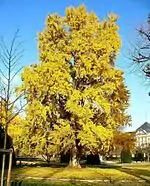ginkgo
English

Gingko tree
Etymology
From Japanese 銀杏, from Chinese 銀杏/银杏 (yínxìng, “silver apricot”). The same characters as in Chinese are used in Japanese, where they can be read ginkyō. Ginkgo is the name that is printed in Amoenitatum exoticarum politico-physico-medicarum Fasciculi V [...] (1712) authored by Engelbert Kaempfer, the first Westerner to see the species. In his way of transcription ginkyo would have been Ginkjo or Ginkio but was printed as Ginkgo.[1] This was read by Carl Linnaeus, and the misspelling stuck.
Pronunciation
- (UK) IPA(key): /ˈɡɪŋ.kəʊ/
Noun
ginkgo (plural ginkgos or ginkgoes)
- Ginkgo biloba, a tree native to China with small, fan-shaped leaves and edible seeds.
- The seed of the ginkgo tree.
Alternative forms
Synonyms
Translations
References
- Wolfgang Michel, On Engelbert Kaempfer’s “Ginkgo”, 2011
Portuguese
This article is issued from Wiktionary. The text is licensed under Creative Commons - Attribution - Sharealike. Additional terms may apply for the media files.